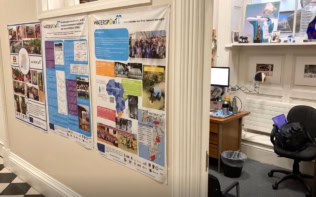Have you ever been contacted by a journalist? If you have, a survey suggests, it was more than likely a pleasant experience.
The survey, which was based on the responses of over 1350 scientists in the US, UK, Japan, Germany and France, indicates that interaction between researchers and the media is more frequent and “smooth” than previously thought (Science 321 204).
The media work according to different rules, it’s not like talking to a colleague Hans Peter Peters, Forschungszentrum Jülich
Although the scientists surveyed were involved in either epidemiology or stem-cell research, there was little difference between the two disciplines which implies that the same good relations might be present in the physical sciences. “We would expect some differences,” Hans Peter Peters, the lead author of the study who is based at the Forschungszentrum Jülich research centre in Germany, told physicsworld.com. “[But] I would expect the result to be rather general.”
‘Overcome that fear’
Peters — who worked with researchers at the University of Wisconsin–Madison in the US, the social-science institution EHESS in France, University College London in the UK and Kansai University in Japan — thinks the survey is important because it goes against the common notion that science and the media are “like oil and water”.
This notion comes about because of the different ways in which science and the media operate. The media, which work on short timescales with a constant drive for “new” stories, are at odds with the gradual, formal progression of science. Peters even points out that the criterion for accuracy differs between journalists and researchers — in journalism, for example, it is sometimes most important to get the right social or political message across.
“Naturally these relationships are difficult,” explains Peters. “There is a fear [among scientists] to lose control of their knowledge.” He notes that many scientists ask to be able to check media articles prior to publication, even though this goes against journalists’ instinct to remain independent. “Scientists can overcome that fear,” he adds.
Positive impact
The survey showed that the overwhelming majority of scientists chose to speak with the media to achieve either “a more positive public attitude toward research” or “a better-educated general public”. Overall, 46% of scientists rated the impact of media stories as “mostly positive”, while just 3% rated them as “mostly negative”.
Japanese scientists were the least pleased with the media impact. Among Western nations, German and US scientists were more pleased than their UK or French counterparts.
However, there are still concerns among scientists about how they are represented by the media. Nine in 10 thought there was a risk of being misquoted, while eight in 10 were wary of journalists’ “unpredictability”.
Peters now plans to perform a comprehensive survey for a range of other research fields, including those in physics. In the meantime, though, does he have any advice for scientists when dealing with the media? “You need to be aware that the media work according to different rules, and try not to assume too much — it’s not like talking to a colleague,” he says.
Peters explains that scientists often do not appreciate that journalists need to create a “picture” of the world. “[Scientists] should have the chance to take part in this journalistic story,” he adds.



